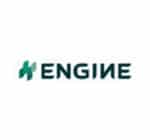ENGINE partners with PRIMA Markets on bio-bunker price benchmarks, and launches Fuel Switch Snapshot

Biofuels have become considerably more mainstream as bunker fuels in the past year and market participants are looking for ways of benchmarking their buying performance against their peers. Combining ENGINE’s conventional bunker fuel benchmarks with PRIMA Market’s assessed biofuel benchmarks, and backing them up with stems, generates robust B24 and B30 benchmarks for Rotterdam, Singapore and Los Angeles.
Together, we are launching a series of eight bio-bunker benchmark prices:
• B30 VLSFO Rotterdam HBE
• B30 LSMGO Rotterdam HBE
• B30 UCOME VLSFO ARA
• B30 UCOME LSMGO ARA
• B24 UCOME VLSFO Singapore
• B24 UCOME LSMGO Singapore
• B30 UCOME VLSFO Los Angeles
• B30 UCOME LSMGO Los Angeles
The two HBE prices listed above contain 30% biofuel produced from advanced bio feedstocks listed in Annex IX Part A of the EU’s recast Renewable Energy Directive (RED II). Advanced biofuel prices are effectively rebated through the Dutch hernieuwbare brandstofeenheden (HBE) system, and this HBE rebate is currently about 3-4 times greater than the EU Allowance (EUA) deduction for the same biofuels.
The six other used cooking oil methyl ester (UCOME) benchmarks represent biofuels produced from bio feedstocks listed in Annex IX Part B of RED II. These do not qualify for Dutch HBE rebates and are therefore typically priced higher than advanced biofuels in the Netherlands – the world’s biggest market for bio-bunkers.
All eight of these new benchmark prices will be displayed with market commentary in the news feed on the ENGINE marine fuel intelligence platform and the PRIMA CarbonZero data analytics platform. ENGINE managing editor Erik Hoffmann said:
“Biofuels are increasingly making their way into the bunker blending pool as regulations on ship emissions tighten and incentives to burn more sustainable fuels grow. Partnering with PRIMA Markets on bio-bunker price benchmarks makes a lot of sense for ENGINE because PRIMA is a trustworthy and rigorous price reporting agency that produces robust price assessments on bio feedstocks and finished biofuels.
In the marine space, ENGINE has developed the industry’s largest database of real bunker market transactions to bring transparency to this historically opaque market. Combining PRIMA’s biofuels expertise with ENGINE’s bunker market intelligence makes for a strong combination and we’re thrilled to be able to deliver these specialist benchmark prices.”
PRIMA Markets director Matthew Stone said:
“The marine market is the latest entrant to the booming renewables space. PRIMA Markets has a long history of helping firms across different verticals develop and execute their emissions reduction strategies. PRIMA Markets provides the data, information frameworks and deep understanding of the market from feedstocks to renewable fuels to allow firms to execute successful strategies in renewables. PRIMA is proud to be working with ENGINE to extend its services to shipping firms, bunker blenders, and the end-users looking to reduce the emissions profile of their products as theycross the globe.”
Introducing ENGINE’s Fuel Switch Snapshot
Despite the EU Emissions Trading System’s (EU ETS) tax on carbon, burning HSFO, VLSFO or LSMGO and paying for the CO2 they emit still pays off when bio-blended alternatives are priced as high as they are today. However, as time goes on and penalties increase, the switch to alternative fuels becomes a question of when, not if
ENGINE’s weekly Fuel Switch Snapshot provides an apples-to-apples comparison of bunker fuels on the market, so buyers can consider not only the outright price of the fuels, but also how far their ships can sail on them and what they will pay to burn them on EU-linked voyages. Once a week, ENGINE will publish a snapshot of alternative and conventional bunker fuel prices in the world’s two biggest bunkering hubs. The prices will come adjusted for calorific contents – the bang for your buck – and with costs of emitting CO2 in the EU both included and excluded. This is to illustrate the impact of the EU ETS on pricing and provide the best possible generalised comparison tool in these fast-changing times.
Read the first edition on how low prices make LNG the obvious choice for most dual-fuel ships these days.
Source: ENGINE
Source link
